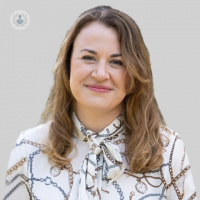Hearing loss: an expert’s insight
Escrito por:Hearing loss is something which, unfortunately, many people experience with increasing age. However, it is not an issue exclusive to older people. Leading consultant adult & paediatric ENT surgeon Miss Victoria Alexander provides an insight into hearing loss, explaining its principal causes, treatment methods, and the question on everyone’s mind; can it be prevented or cured?

What are the main causes of hearing loss?
Hearing loss is broken down into two different types. The first type can be nerve damage called sensorineuronal hearing loss, mainly caused by aged-related deterioration, followed by trauma either directly to the ear, or from damage caused by exposure to loud noises.
The second type is conductive hearing loss. This is where part of the mechanics of hearing doesn’t work as well, meaning that the sound doesn’t travel to the brain effectively. The most prevalent cause of this is ear wax, but can also be triggered by ear infections; a hole in the eardrum and damage to the bones of hearing which are attached to the eardrum will also cause this type of hearing loss.
It is also possible to have both types of hearing loss at once, referred to as mixed hearing loss.
Is hearing loss preventable?
Yes, hearing loss can be preventable. Wearing ear protection is crucial if you work with loud machinery or in a busy, noisy workshop, in order to reduce damage to the ears, and limiting the volume of your personal devices and headphones will also reduce the amount of damage secondary to loud noises. Additionally, wearing hearing aids has also been proven to slow cognitive decline in older adults who have memory issues.
If you have a hole in your eardrum, it is vital to protect the exposed middle part of the ear from water, as this prevents infections and protects the hearing bones from becoming scarred and stiff, which can affect the hearing long term.
It should be noted that certain drugs and medications can provoke hearing loss. For example. some chemotherapy agents. However, your oncologist will be aware of these risks and can provide advice on the risks, as well as what to look out for.
Can hearing loss be reversed or cured?
Hearing loss can be reversed or cured, but this possibility depends on the type of hearing loss. Sudden nerve hearing loss (sensorineuronal) although rare, can occur with no proceeding illness. In addition, steroids can reduce inflammation, and in some circumstances, occasionally injecting a steroid through the ear drum can make hearing normal again.
If the medications are responsible for the hearing loss, it may be necessary to stop using them, unless there are no alternative options, in which case, consulting with an ENT surgeon is advisable. Other types of sensorineuronal hearing loss can be improved by wearing hearing aids.
Conductive hearing loss can often be improved with ear surgery. This may involve procedures such as closing perforations in the eardrum or reconnecting the auditory bones using a medical adhesive or a titanium implant. In cases where the bones have become too stiff and immobile, an ear surgeon can replace the affected bone with an implant, which can significantly improve hearing.
What are the most popular treatment options for hearing loss?
The most popular treatment options for hearing loss are:
- Hearing aids
- Myrignoplasty (repair of a hole in the ear drum)
- Ossiculoplasty (reconnecting the hearing bones with an implant)
- Stapedectomy (removing the last hearing bone and replacing it with an implant).
How does age-related hearing loss differ from other types?
Age-related hearing loss often involves the loss of the higher frequencies, and tends to be the same in degree of the loss in both ears. This hearing loss is also gradual, which is why many people do not seek help when they should.
Can hearing loss be a sign of other health issues?
Certain types of hearing issues can be associated with autoimmune health conditions such as rheumatoid arthritis and lupus.
Although extremely rare, hearing loss can it be a sign of a benign lesion growing on the balance nerve in the brain, called an acoustic neuroma or vestibular schwannoma. This is often only associated with asymmetrical hearing loss, one-sided tinnitus and occasionally, balance disturbance and facial numbness.
If you are concerned with hearing loss and would like to book a consultation with Miss Alexander, do not hesitate to do so by visiting her Top Doctors profile today.


